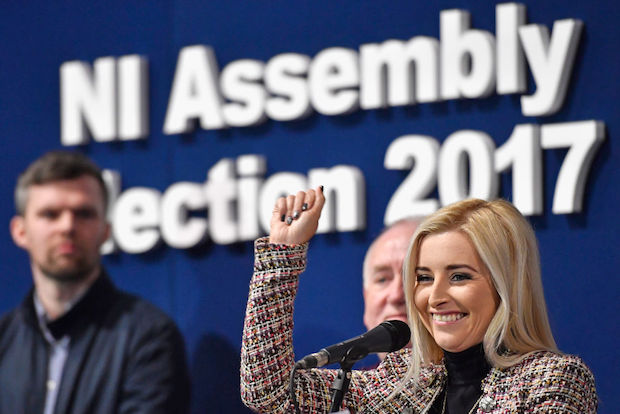They were the elections you didn’t hear about, because the UK press mainly instead covered Bruce Forsyth’s chest infection. But Northern Ireland just woke up to a world where the Unionists’ vote share is a princely 45.7%.
It was the highest turnout since 1998 (64.8%), the year of the Good Friday Agreement, that buoyed Sinn Féin to within a pip of the DUP–the latter on 28 seats and 28.1% of first-preference votes, the former on 27 and 27.9%.
So the two unionist parties, the DUP and UUP, jointly now have 38 seats in a 90-seat assembly. While Sinn Féin and the SDLP (after a surprisingly very good election day) have 39.
It doesn’t change the maths–the DUP and Sinn Féin still are the largest unionist and nationalist parties, and will still nominate (or more likely, won’t) a First Minister and deputy First Minister in the next three weeks to form a new joint executive. But it changes utterly everything about the psychology.
Arlene Foster – who presided first over the ‘Cash for Ash’ scandal, then a divisive, petty campaign plagiarised from the worst days of Ian Paisley – proved the best get-out-the-vote sergeant for nationalist voters living in West Belfast and west of the Bann generally, many of them young and casting first ballots. Sinn Féin’s photogenic, young new leader Michelle O’Neill–such a refreshingly new quantity that she was denied entrance to her own count in Ballymena for not having photo ID – has every incentive to sit back and let the unpopular Foster twist and cling to her party’s leadership as resolutely as Jeremy Corbyn is doing across the water.
Sinn Féin has said it won’t nominate a deputy First Minister so long as Foster would be First Minister, not anyway until there is a full investigation of Cash for Ash. It wouldn’t be a bad bet to expect Direct Rule to be imposed before the month is out (The ‘Vote Arlene, get Theresa’ scenario).
And if you think Foster’s gormless intransigence was great for the nationalist vote share, wait till you see what Direct Rule and Brexit will do to annoy nationalist voters right into a united Ireland.
Bear in mind Brexit, whatever its effects on the UK generally, will kneecap Northern Ireland. Belfast’s 1,200 financial services firms providing ‘nearshore’ support for London will be hit hard by the Brexodus. Farms accounting for 35% of NI’s EU exports, compared to 10% of the UK’s, will bear the brunt of tariffs after a hard Brexit. Plus Remain won here by 56% to 44%.
There’s another story here, too. It’s the rise of the parties, like Alliance and the Greens, that are neither nationalist nor unionist: fueled by the votes of detribalised, social liberal Protestants.
If you’re from Northern Ireland and under 40, you were #awakeforbailey, a Green in Belfast South, until 3.15 am and having to explain this morning why a woman called Clare kept you awake online all night.
Relatedly, one tiny thing this election changes in the meantime is same-sex marriage: which won a majority in the Northern Ireland Assembly in 2015, then was vetoed by the DUP under an odd Stormont tactic, called a Petition of Concern, that lets 30 members block anything they find noxious. The DUP have 28, and can now watch and see as formerly sleepy Northern Ireland explodes in a mélange of Kylie and Elton John.
Come on, Arlene
Will she stay or will she go now? Arlene Foster did not have a good election: in fact, she appears single-handedly to have reversed a lengthy slide in nationalism’s electoral fortunes. If others in the DUP were able to dislodge her, they would remain in the driver’s seat of devolved government (the ‘taxi for one for Arlene’ scenario). Begging deputy leader Nigel Dodds back to Belfast North by way of the Chiltern Hundreds would top the runners and riders for a replacement (‘He wouldn’t like it, he’s quite happy in Westminster,’ a senior civil servant told me).
Barring this, look for direct rule to take place within a month, while the Brits frantically try to get Foster and O’Neill to launch, against both their inclinations and O’Neill’s interests, a sister act.
Ten years ago, Peter Hain as Northern Ireland Secretary managed to cobble together Ian Paisley and Martin McGuinness into a power sharing arrangement by the threat of water metering. James Brokenshire, now in the hot seat, will need to scour for something similarly mundane and annoying. Top tip for HM Secretary of State: think about streamlining the assistance package to manufacturing and increasing local taxation – probably needed and both about as popular as an STI. These needed and exquisitely painful economic reforms should fit the bill nicely.






Comments